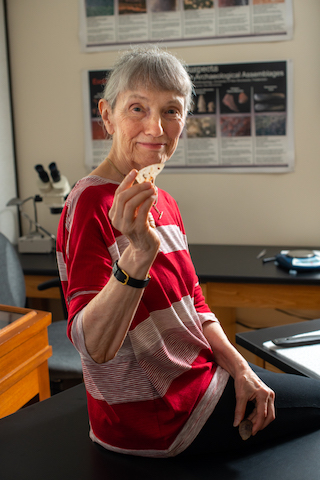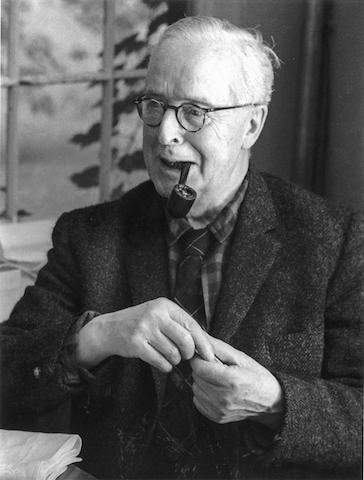
Born in 1883, George Frederick Clarke (LLD'69) was one of New Brunswick's most notable writers, publishing 13 books and dozens of short stories. Through the George Frederick Clarke Project, Mary Bernard (BA'62) (and Chapel Street Publications) is bringing her late grandfather's work back to life, re-editing and re-issuing his books for a new generation of readers.
"George Frederick Clarke was a born writer," says Bernard. "He wrote poetry from the age of about eight and stories by the time he was 12. He never stopped writing. Even during the years when he was working as a grocery clerk for 13 or 14 hours a day, six days a week, he wrote."
Although a dentist by trade, Clarke's passion was archaeology and the history of New Brunswick. As an author, he was best known for his salmon fishing memoirs -- Six Salmon Rivers and Song of the Reel -- and his non-fiction books on archaeology and First Nations People. An avid sport fisherman and conservationist, some of his published works and personal crusades centered around the plight of New Brunswick’s river systems. He also wrote novels and children’s books, and his knowledge of New Brunswick geography, history and culture is portrayed in the lives and circumstances of his characters.
"He wrote about everything that interested him and he was intensely engaged with the world around him, as well as with the past of our province," says Bernard. "He was a writer with a traditional style, but what he wrote about has never been more relevant: conservation, the rights of minorities, the recuperation of the past. That's why the George Frederick Clarke Project was started -- to bring his stories back to life, many of which have been out of circulation for decades."

The first six of Clarke's books were written between 1920 and 1950 when, according to Bernard, almost no writer was both living in New Brunswick and writing about it. "There were other New Brunswick writers at that time, like Charles G.D. Roberts and Bliss Carman, but they moved away to other parts of the country and to the United States," says Bernard. "I think that's what makes my grandfather's work still moving and relevant today. He wrote about a world he knew intimately. From his first short story to his last book, his stories were about our province."
Many of Clarke's adventure novels appealed to both adults and children. Over the past three years, seven of Clarke's books have been re-published, including a children’s book Jimmy-Why and Noël Polchies; the historical novels David Cameron's Adventures and David Cameron's Return; his collected short stories, The Ghost of Nackawick Portage; and his memoir of his archaeological finds and adventures, Someone Before Us: Buried History in Central New Brunswick. The next two books in the project are Chris in Canada, the story of an English boy who emigrates with his family to a farm on Howland Ridge, N.B., overlooking Taffa Lake; and Chris in the Wilderness.
"I grew up in Montreal, but spent every summer of my childhood and youth in Woodstock with my grandparents," says Bernard. "I was 33 when my grandfather died, and in the decades before that, I spent many hours talking with him and recording his stories and reminiscences. The George Frederick Clarke Project is about sharing my love of these wonderful stories with new generations of readers."
(Top Photo: Mary Bernard sits among pieces from the George Frederick Clarke artifact collection, located in the anthropology department at UNB.)
(Bottom Photo: George Frederick Clarke. Credit: Mary Bernard)